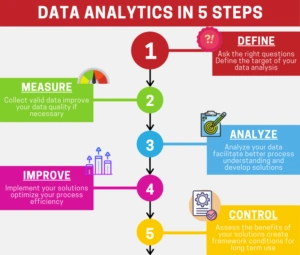Explain the skills needed for PhD data analysis. And explain how this activity enriches the researcher’s experience
In-Brief
- Data analysis is the critical part of any research. Data analysis summarizes already collected data.
- It is the process that involves the interpretation of data gathered through the use of analytical and logical reasoning to determine the patterns, relationships and trends on the research topic selected.
- Each field, in PhD Statistical Data Analysis, has its specialist skills. Besides, there are a handful of key skills which are essential to successful research.

Project Management skill
Every Research requires project management skill, the five major phase of project management include conception and initiation, planning, execution, performance/monitoring, and project close. It is the process of high-quality planning before beginning the project. This step is nothing but making a step by step plan on how you intend to reach the final goal for your research.
Tasks as a project manager are likely the following: Gathering required information, deliverables, and timeframes from completion of work Planning your resources. You set achievable aims, realistic techniques to achieve the goals and identify other necessary resources such as human resources and finances.
It is a crucial phase; you need to complete research work to receive external funding and to get your project off the ground. PhD Data Analytics Consultant asks for history, observe, ask questions and learn as much as possible before the starting to give a quality result.
Handling Budgets
Next critical skill is learning how to manage your budget effectively. If applying for research funding, you must say about the plan and how spending money on this project will help you to answer your research question. So developing the budget is the perfect start to plan your project. Best PhD Data Analytics Consultant helps in framing a reasonable budget that shows the assessors to have thought about your research in-depth to frame and, if it is over well, it can serve as an excellent, convincing overview of the project.
It would be a useless task if you did not do this step with in-depth research. If it is so gain some further knowledge of handling budgets or else make use of PhD Data Analytics Services expertise to lead your research project.
Simple steps to create a budget for research
List your activities:
Prepare a list of procedures that you planned to do in your research, how you are going to achieve it. To make a list, put a flowchart of methodology and make a list of methodology name and its allowance. The plan must be something like points that provides all the needed information for funding.

Recheck the rules:
Once you’ve listed everything you want to research, go back and recheck the specific rules for budgets. What is allowed? And what isn’t? The funding scheme won’t pay for equipment usage– you’ll need to fund. Some schemes won’t invest people. Others won’t fund travel. So, It is essential to check what you need for your project. It is just an important part to know what you can include in the application that you are writing right now.
Cost each item:
Give the cost list of every item included in the plan. Find a reasonable cost. Are you going to conduct an interview with the people and do the statistical analysis on your own? If so, How much time? What is the plan for teaching? What is your salary for that period, or how much will it cost to hire a replacement source? PhD Data Thesis Statistics Help work out what level is required to employ them, and find out how much that costs.
If you are going to work with the research assistant from Dissertation Consulting for PhD Students, Know how long you need a research assistant to work for your project.
Justify it:
For each item in the budget section, you should justify the reason for money and justifying how that process will effectively increase the value of research. The budget justification links budget to your project and plans again and again. Best PhD Programmers in Data Analysis pick each item used in your budget justification to get a clearer view.
Team Leading/Managing:
Providing full strength is difficult in the academic world. However, the research project requires support from others to lead the project. There are two things to consider to manage research, how to get the best out of the study and how to take the practical application out of the research. PhD Data Analytics Consultant Services assess current needs and vulnerabilities that are needed to lead the research successfully.
Handling Data:
Handling the data is depends on the result you gain from the project, which includes lab experiments, statistical evidence and interview. Whatever may be the result, you should handle a large amount of data. Without sufficient data skill, you will never get the existing stage of analyzing your research. Start with organizing the paper-based data storage system. Organize store your hard copies of raw materials. Keep records of who is involved in collecting the data.
If you on go Quantitative Research or a Qualitative type of Research, it is challenging to analyze your gathered data accurately. If there is a need to publish your paper in a reputed journal, then must consult expert service to guide in various stages of writing to get a quality article. You can feel tension free when we are supporting you. Now you can leave data analysis trouble to PhD Statistical Consulting & Data Analysis to get a solution for the problem related to your academic writing.
References:
- Assarroudi, A., Heshmati Nabavi, F., Armat, M. R., Ebadi, A., & Vaismoradi, M. (2018). Directed qualitative content analysis: the description and elaboration of its underpinning methods and data analysis process, 23(1), 42-55.
- Murdoch-Eaton, D., Drewery, S., Elton, S., Emmerson, C., Marshall, M., Smith, J. A., … & Whittle, S. (2010). What do medical researchers understand by research and research skills? Identifying research opportunities within undergraduate projects. Medical Teacher, 32(3), e152-e160.
- Bazeley, P. (2013). Qualitative data analysis: Practical strategies. Sage.



